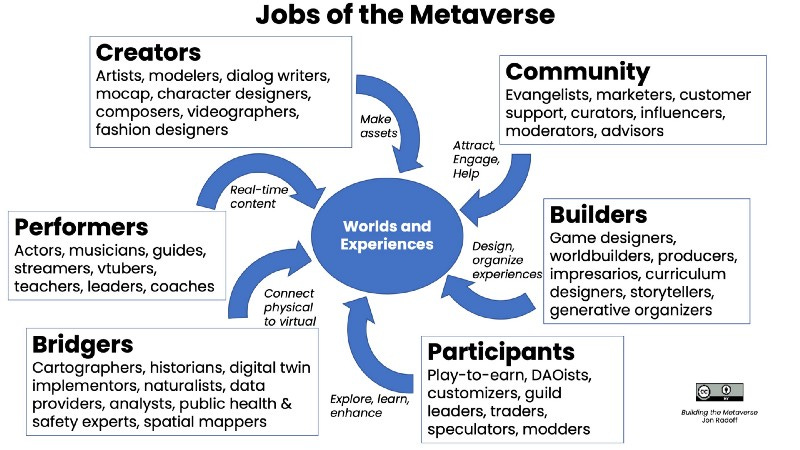Jobs in the Metaverse
The metaverse is unleashing a wave of new economic opportunities for people around the world. What are the jobs that are opening up?
The metaverse is unleashing a wave of new economic opportunities for people around the world. This article is about the new forms of employment emerging in this next generation of the Internet.
Naturally, a huge number of the jobs are going to be in the science, engineering and business jobs required to build the entire value-chain from semiconductors and basic materials on up to the enabling software; but here, I’m focused on the jobs that going to be in the metaverse, rather than the jobs involved in making it… because this is the aspect of the metaverse that is transformative for the work we all do.
Creators
In a recent earnings transcript, Unity noted that game making is already trending towards far more artists relative to the number of technologists. This informs how the metaverse will grow as well.
Everyone who adds to the metaverse is part of the creator economy, but here I’m referring to the people that make the components that other builders, performers and participants will embed, mash-up and otherwise make use of
This includes artists, modelers, dialog writers, motion-capture creators, dialog writers, character designers, composers, videographers, fashion designers and countless other forms of creativity.
Participants and Players
This includes play-to-earn, participants in the governance of DAOs (distributed autonomous organizations — people I’m calling DAOists), customizers, guild leaders, traders, speculators, modders.
Play-to-earn (P2E) requires some added explanation.
Currently, play-to-earn roughly mirrors the world of “gold farming” that has occurred in MMORPGs like World of Warcraft; the players are leveling-up and collecting characters. The difference now is that some games are being built around this economic structure from the start, rather than suffering with an illicit secondary market.
It is important to apply some imagination to how play-to-earn will evolve: it won’t be limited to powerleveling services. Games will encompass creator economies of their own — with opportunities for participants to earn through customization, experimentation and exploration.
Performers
This is really another form of creators, but focuses on the jobs that are real-time in nature (as opposed to previously-created or recorded). This includes live acting, musicians, guides, streamers, vtubers, educators, leaders and coaches.
Community
One of the advantages of the metaverse is that it will put creators and performers in closer contact with the participants in their communities. These jobs involve attracting, supporting and helping members of the community — as well as staying on top of moderation, preventing harassment and other toxic behavior.
This will spur new employment for community managers and leaders, customer support, moderators, evangelists, influencers, advisors and curators.
Builders
These people will be the designers and organizers of experiences: the game designers, experience creators, producers, impresarios, curriculum designers, storytellers and those who structure generative art.
Bridgers
Remember, the metaverse is not just a place we’ll go into — it will be all around us. Think of it as an alternative planes of existence, some of which will layer right over our physical world…and often be informed by what happens in physical reality.
This will require large numbers of people to implement digital twins, geotaggers, cartographers, naturalists, spatial mappers, historians, traffic analysts, public health & safety experts, data providers, spatial mappers.
Further Reading
If you want to learn more about the experiences people will be having in the metaverse — where all these jobs will be situated — read The Experiences of the Metaverse.
If you want to understand the different types of companies that are building the metaverse, check out Market Map of the Metaverse.
Learn more about some of the forces shaping the game industry in Game Development Trends in 2021. Whether you’re building a game or not, the trends of solo-to-social, games-as-economies and technologists-to-artists are important for understanding how the metaverse will evolve.
Still a bit confused about what the “metaverse” even is?
I made an article on that subject, but you might find my video the easiest to digest:


